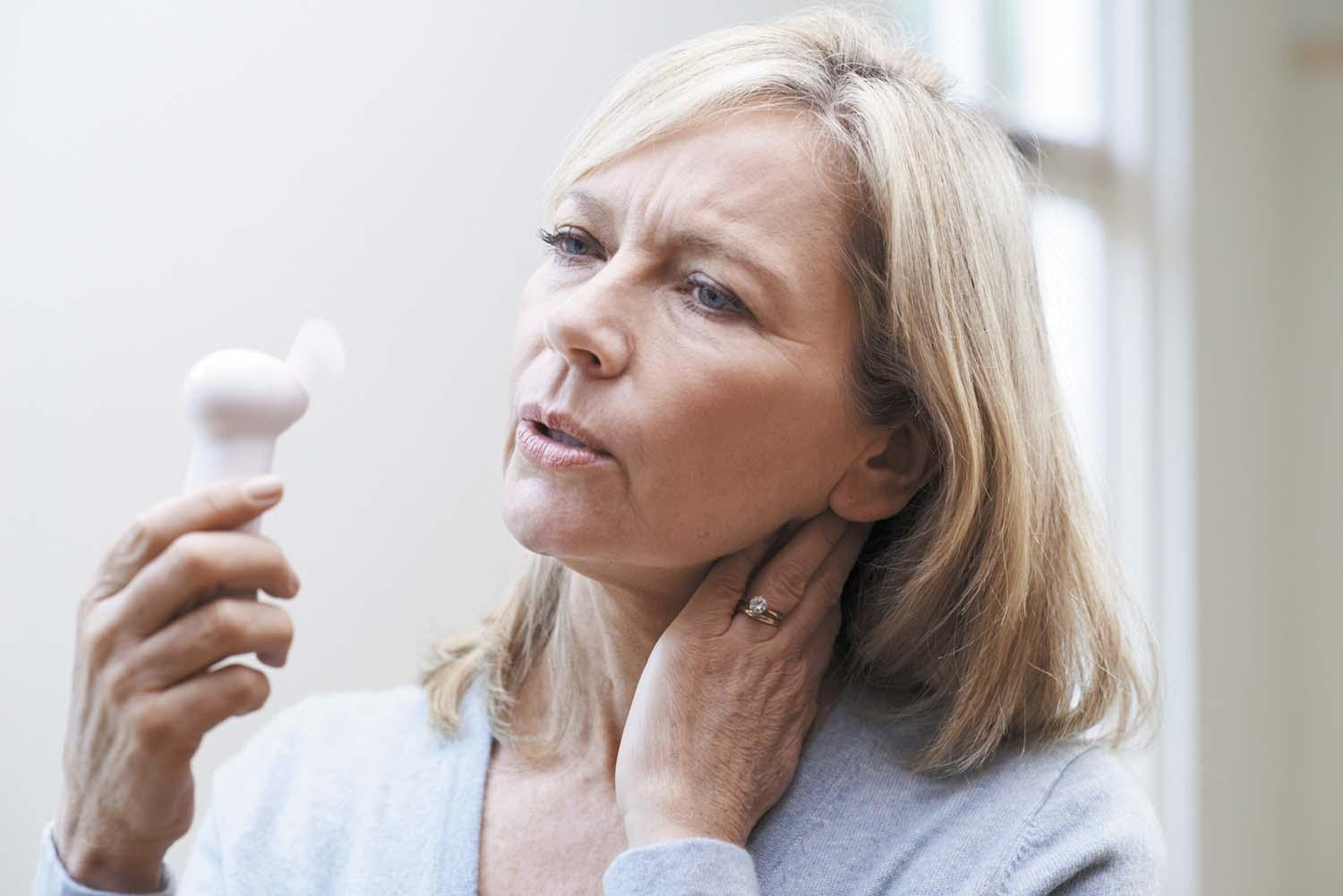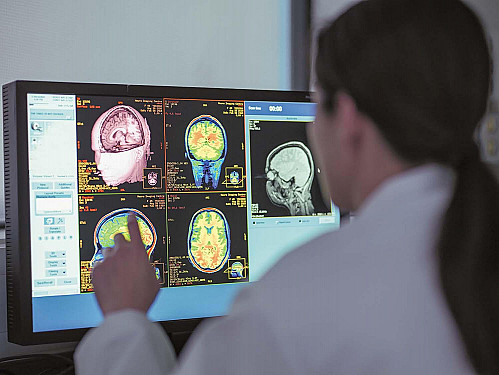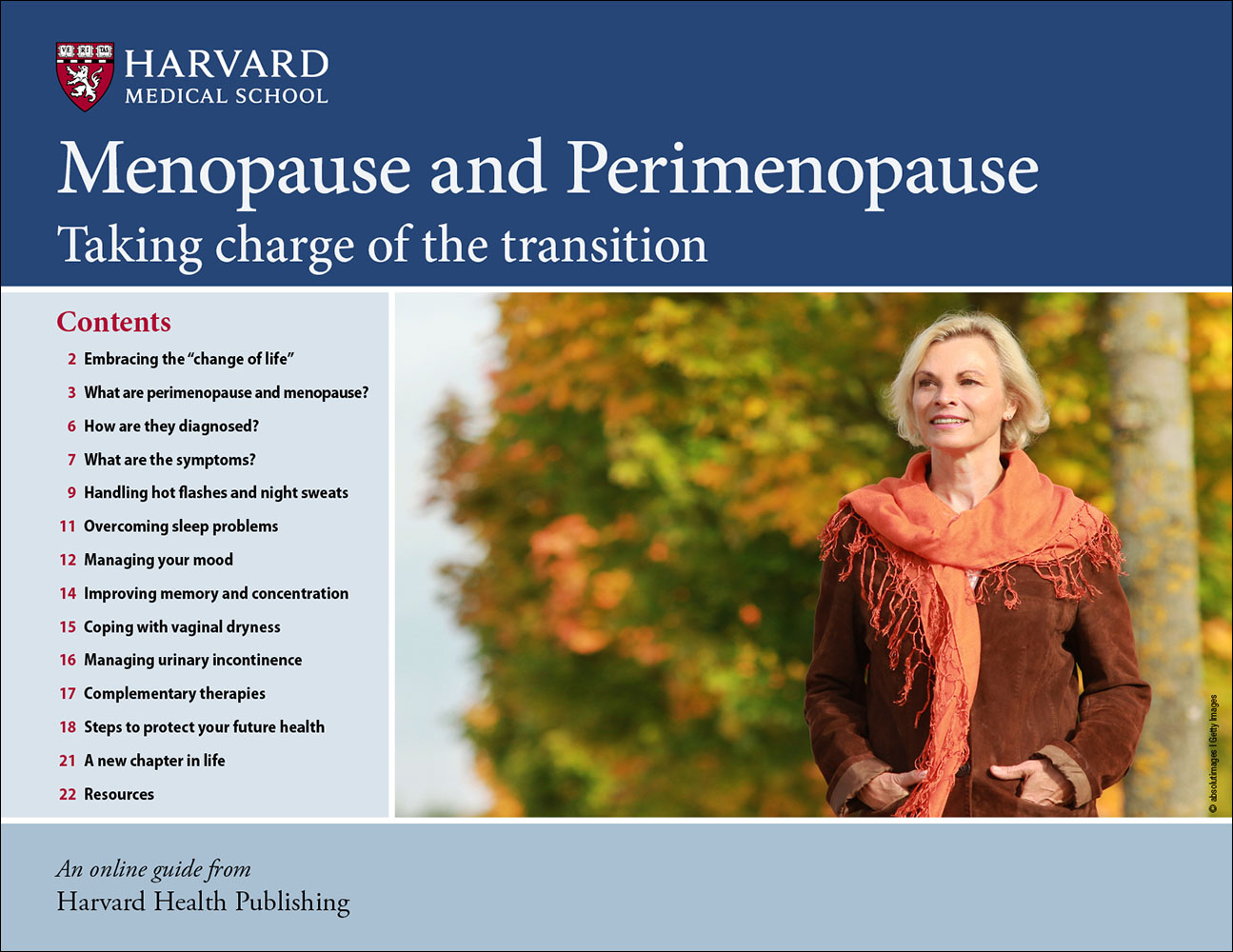Are hot flashes a warning sign?
As research explores the ties between this common menopause symptom and brain and heart health, it's wise to proactively manage your risks.
- Reviewed by Toni Golen, MD, Editor in Chief, Harvard Women's Health Watch; Editorial Advisory Board Member, Harvard Health Publishing; Contributor

If you’re among the eight in 10 women for whom hot flashes and night sweats have been a prominent (and often miserable) part of menopause, you may have groaned at recent research indicating these so-called vasomotor symptoms aren’t just tough to take—they may be a harbinger of disturbing health problems.
A study in the November 2024 issue of Menopause suggests severe hot flashes and night sweats are linked to an increased risk of developing cognitive problems, while other studies indicate these symptoms are tied to higher odds of cardiovascular disease.
But, like much observational research — which can’t prove a cause-and-effect relationship between a symptom and certain health outcomes — these studies don’t necessarily account for other health and lifestyle factors that influence brain and heart health as we age as well as the likelihood of having hot flashes themselves, says Dr. JoAnn Manson, chief of the Division of Preventive Medicine at Harvard-affiliated Brigham and Women’s Hospital and a professor of women’s health at Harvard Medical School.
Indeed, the link between vasomotor symptoms and these foreboding conditions is far more nuanced, she says. “I think it’s actually very complicated, and women in perimenopause or early menopause should not be alarmed,” Dr. Manson says.
Complex contributors
Increasing evidence shows several other factors strongly influence the link between vasomotor symptoms and later cognitive or cardiovascular problems, Dr. Manson says. They include
- the age when vasomotor symptoms occur
- the time since menopause
- the severity of hot flashes, and if they happen along with night sweats and disrupted sleep
- the cardiovascular system’s overall health and function.
The Menopause study indicated that women who have more severe hot flashes are also likelier to have common heart disease risk factors. “Women who have high blood pressure, high cholesterol, obesity, diabetes, or other risks for cardiovascular disease may have some damage to the lining of the blood vessels and their function,” she explains. “That may make them more likely to have hot flashes.”
And while hot flashes could indeed be a marker for higher odds of cognitive problems, she says, the question remains: are vasomotor symptoms tied to cognitive impairment on their own, aside from these other risk factors?
The answer appears to be no for women in early menopause. Half of the nearly 1,300 Latin American women (average age 56) participating in the Menopause study weren’t physically active. But participants who exercised and had a lower body mass index were less likely to be cognitively impaired. “Women with healthy lifestyle factors seemed to be buffered from that,” Dr. Manson says.
The link between vasomotor symptoms and cardiovascular disease is stronger, however, when hot flashes persist after age 60 or happen for the first time years after menopause. “Timing is everything,” she says. “I think it can be reassuring to women that if these symptoms are occurring early in menopause, they’re not clearly linked to an in-creased risk of cardiovascular disease or dementia.”
The role of sleep
Because hot flashes and night sweats so often disrupt sleep — and sleep problems are known to affect brain health — Dr. Manson wonders if the connection between vasomotor symptoms and dementia might largely be explained by this factor alone.
Fragmented sleep is also linked to a variety of issues that increase the chances of cardiovascular disease, including weight gain, high blood pressure, high cholesterol, and diabetes, she says.
“It’s possible that sleep disruption itself contributes both to an increased risk of cardiovascular disease and dementia, because adequate, restorative sleep has been shown to be really important for cardiovascular and cognitive health,” she says. “All of those outcomes are linked to sleep and sleep quality.”
For heart health, menopause is better late than on timeFor the punctual among us, being late for anything feels unsettling. But a recent study suggests it can indeed be a good thing for women to reach menopause later than average — 55 or older — because they may have healthier blood vessels for years to come. The finding, published in the February 2025 issue of Circulation Research, could translate into lower heart attack and stroke risk for women who hit this reproductive milestone four or more years after the average American woman, whose periods cease at age 51. The study reinforces earlier evidence suggesting that women hitting menopause at 55 or older are around 20% less likely to develop cardiovascular problems as peers who reach menopause between 45 and 54. But it also goes further by delving into why this may be the case. Using a measure called brachial artery flow-mediated dilation — which shows how well the main blood vessel in the upper arm widens with increased blood flow — researchers assessed the blood vessel health of 92 women. Twenty-one were premenopausal, while 49 hit menopause between 45 and 54, and 22 reached menopause at 55 or older. The team also measured the health of the mitochondria, which are considered cells’ “energy powerhouses,” in the linings of the women’s blood vessels. Additionally, they examined what kinds of molecules were coursing through the women’s bloodstreams. Later-onset menopausal women had better blood vessel dilation than those who hit menopause at the average age, meaning their arteries could widen more easily to support healthy blood flow. This was linked to lower levels of certain reactive oxygen molecules that can harm the heart and blood vessels over time. The differences between the groups also persisted for five or more years after the women went through menopause. Dr. Cara Guardino, a cardiologist at Harvard-affiliated Mount Auburn Hospital, believes the findings add important insight into a seemingly mysterious process. Women who reach menopause later have been exposed to higher levels of estrogen for longer, which may help explain the results. “There isn’t a lot of information that looks at why women, after they go through menopause, have a real spike in cardiovascular disease,” she says. “Before menopause, women have a lower incidence of cardiovascular disease compared to men, and they catch up to men after menopause. This study really points specifically to what factors may account for this.” Women who suspect they may reach menopause earlier than average because of their family history should be monitored more frequently for heart disease, including blood pressure and blood cholesterol checks, Dr. Guardino advises. Heart disease remains the top killer of women and men across the globe. “If someone undergoes menopause earlier, we should be more aggressive by intervening on her risk factors for cardiovascular disease,” she says. |
Stay-well strategies
If you’re dealing with severe hot flashes or night sweats — especially if they stop you from sleeping well — Dr. Manson offers this guidance to minimize your odds of developing cardiovascular disease or dementia.
Don’t wait to seek help. “If you find hot flashes bothersome and they affect your quality of life and disrupt your sleep, it’s important to talk to your provider and get treatment,” she says. A variety of measures can effectively quell vasomotor symptoms, including hormone therapy or nonhormonal options such fezolinetant (Veozah), certain antidepressants, gabapentin (Neurontin), and lifestyle tactics.
Investigate unusual timing. If you still have hot flashes 10 or more years after menopause, or develop these symptoms anew, discuss this fact with your doctor. She may want to explore whether your symptoms indicate heart problems or other conditions. “You could undergo testing to be sure your symptoms are in fact related to menopause and not another underlying cause,” Dr. Manson says.
Aggressively treat risk factors. High blood pressure, high cholesterol, and diabetes are major contributors to both cardiovascular disease and dementia because they damage blood vessel health. In addition to taking medications, you should exercise regularly, get adequate sleep, and maintain a heart-healthy diet that includes fruits, vegetables, whole grains, olive oil, fish, lean meats, nuts, and seeds.
“There’s a lot we can do to decrease our risk. Practicing a healthy lifestyle and eating a heart-healthy diet go a long way toward reducing the risk of cardiovascular disease and dementia as women traverse menopause,” Dr. Manson says. “That’s a more important message than focusing on whether your hot flashes should cause alarm.”
Image: © Highwaystarz-Photography/Getty Images
About the Author

Maureen Salamon, Executive Editor, Harvard Women's Health Watch
About the Reviewer

Toni Golen, MD, Editor in Chief, Harvard Women's Health Watch; Editorial Advisory Board Member, Harvard Health Publishing; Contributor
Disclaimer:
As a service to our readers, Harvard Health Publishing provides access to our library of archived content. Please note the date of last review or update on all articles.
No content on this site, regardless of date, should ever be used as a substitute for direct medical advice from your doctor or other qualified clinician.
















